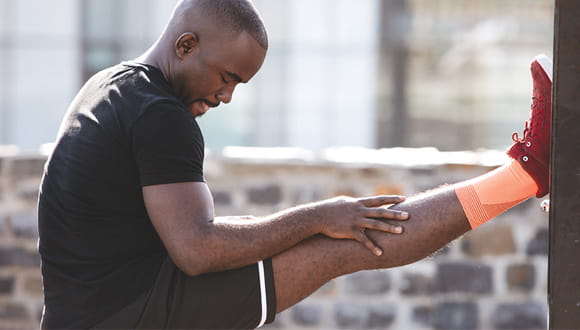Is Lactic Acid Buildup Really What Causes Muscle Soreness After a Workout?
Oct. 19, 2021 - Katie McCallumWhether you look forward to your workouts or not, it seems that we all dread feeling sore afterwards.
So, naturally, the "advice" and products to prevent sore muscles are virtually endless — from supplements aimed at boosting recovery to gels intended to limit the soreness that lactic acid supposedly causes?
"I'm asked if lactic acid buildup causes sore muscles almost every single day," says Dr. Corbin Hedt, physical therapist at Houston Methodist. "It's something many of us grew up hearing from coaches or whoever so people want to know how to reduce this buildup so that they never have to be sore at all. It's not true, however."
If you've got questions about muscle soreness — from what's actually causing it to whether or not it can be prevented — you're not alone.
Fortunately, it's something that Dr. Hedt says has been studied in detail. And it's a topic he could talk about for hours.
What does lactic acid have to do with muscle soreness anyways?
Your muscles need energy to move, but the way they generate energy can vary depending on the type of workout you're doing.
During aerobic exercise, such as walking, light jogging or casual biking, your muscles use oxygen to make the energy they need.
During vigorous exercise, like sprinting, plyometrics, weight lifting and high-intensity interval training (HIIT), your muscles make this energy anaerobically — meaning in the absence of oxygen. This happens because oxygen can't get to the muscle fast enough to keep up with the amount of energy the muscle needs.
"When your muscles are making energy anaerobically, lactic acid is created as a byproduct," says Dr. Hedt. "It does build up in the muscle during exercise, and your muscle can be chock-full of it by the time you finish a strenuous workout, but generally all of this lactic acid is gone within about an hour afterwards."
Put simply, lactic acid clears out well before muscle soreness ever even begins. And Dr. Hedt adds that the link between lactic acid buildup during exercise and muscle soreness after exercise is one that's been almost completely disproven.
"In fact, lactic acid buildup after a hard workout might actually cue muscle regeneration — acting as a signal to your body that your muscles have worked really hard and need to be repaired and rebuilt," Dr. Hedt adds. "If anything, you want lactic acid buildup because the more that you have, the more your body understands that the area needs attention."
Why do muscles get sore, then?
"Muscle soreness occurs because muscle and the connective tissue around it get damaged during exercise," explains Dr. Hedt. "This is completely normal and nothing to worry about, though. In fact, it's needed for muscle growth, since muscle is built back stronger during this repair process."
This damage comes in the form of tiny microtears, which trigger inflammatory responses.
So that soreness you feel after a hard workout? It's an unfortunate consequence of both this damage and the inflammatory processes needed to heal it, not lactic acid buildup.
Plus, the delayed nature of sore muscles provides yet another strike against the lactic acid theory.
"Muscle soreness doesn't actually begin right after strenuous exercise, or even on that same day," Dr. Hedt adds. "Usually you don't actually feel sore until about 24 to 72 hours after your workout. This is why it's called delayed onset muscle soreness, or DOMS."
(Related: Is Your Pain Just Muscle Soreness or a Serious Injury?)
But none of this changes how we feel about muscle soreness. (As mentioned, we hate it.) So when it comes to preventing delayed onset muscle soreness, is there anything you can do?
"There's really no general consensus in terms of how to completely prevent sore muscles," says Dr. Hedt. "It's just something we have to go through if the goal is to work our muscles hard and build them back stronger."
That being said, he adds that there are ways to reduce how sore your muscles feel after a workout, or even speed up how quickly this soreness subsides, including:
- Slowly ramping up the intensity of your workouts
- Using a massage gun
- Foam rolling
- Active recovery, such as walking, light jogging or yoga
(Related: Should You Still Work Out When You're Sore or in Pain?)








